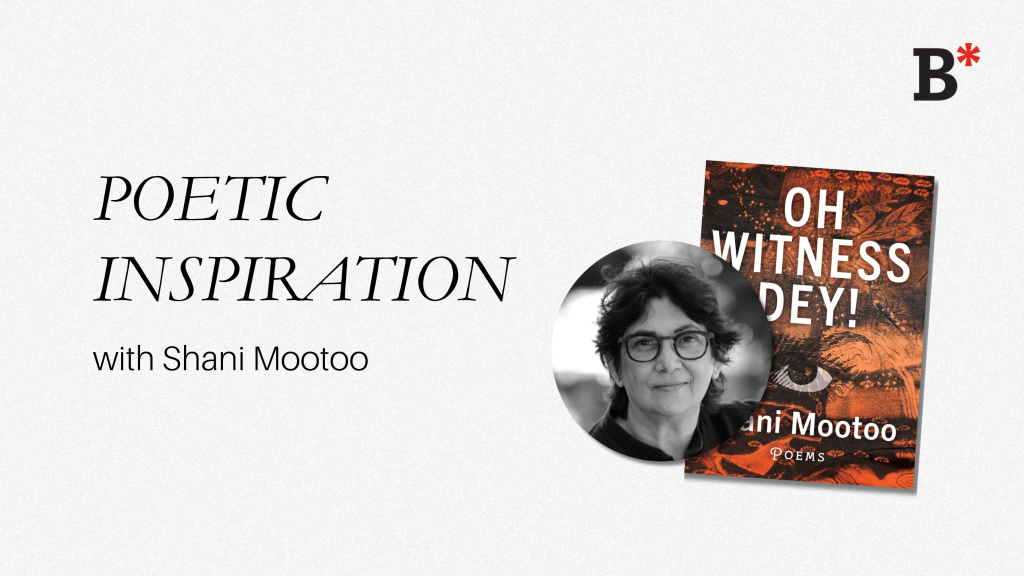Poetic Inspiration with Shani Mootoo

Next up in our “Poetic Inspiration” series is Shani Mootoo, author of Oh Witness Dey!
B*: Please share up to three poetry books or poets that are important to you, and helped influence the writing of Oh Witness Dey! Please also share how they influenced your book.
SM: Amongst the several poets whose shoulders I have climbed and continue to climb are two who have influenced me not only in the writing of Oh Witness Dey! but throughout my various art practices, and even in how I live my life.
John Cage is famously known as a composer, but his book M: Writings ‘67-’72 (Wesleyan University Press, 1969) is an interesting exercise in using structuring rules, within which to break all others. Cage employed over 700 different typefaces in this one book, and a variety of structures from one ‘poem’ to the next. In a beautiful forward, he writes about syntax:
“Syntax, according to Norman O. Brown, is the arrangement of the army. As we move away from it, we demilitarize language. This demilitarization of language is conducted in many ways; a single language is pulverized; the boundaries between two or more languages are crossed; elements not strictly linguistic (graphic, musical) are introduced; etc. Translation becomes, if not impossible, unnecessary.”
M and this passage have been, for decades, how-to instructions in all my artmaking and creative writing. It has been a map of how to use (and instructively ab-use) language; specific to me, the language of the coloniser, as it collides with the various and constantly influx resistance syntaxes of the colonised. But it is not just Cage’s writing that influences my own. His (in)famous musical work 4’33” is a bold faced instruction on how to listen, how to perform, what is music, what is silence…is silence even silence? This translates, for me, to questions about the tools of writing, and writing poetry in particular. Through M, for instance, I am instructed in the art and act of questioning the media in which one works, the content, the form, and the material. Much of this is borne out in my writing of Oh Witness Dey!
Speaking frankly and honestly, as an immigrant to this country and a person with multiple minority identities, I do not always feel I have the luxury or privilege of making art that is about ordinary things, the easy and pleasant joys that do mean so much to me. I must ‘speak out’ but I can’t ignore the gorgeousness of life, either. Gregory Scofield’s book Love Medicine and One Song (Polestar in 1997) is one of my all-time favourite books. Queer love is not only as ordinary as Nabakov-love, but as beautiful, and as poignant as Dionne Brand’s political poetry. How to write and be heard when it comes to the hard things in life. How to seduce the reader into listening, into loving what you have to say, even when it is difficult. How to make what is taboo ordinary, and beautiful. I have followed this book in life and writing for almost three decades. If you know it, you may well see its influence, combined with Cage’s, on how I approach my work and life.
B*: Please share a writing prompt for aspiring poets that you have used to start composing a new poem.
SM: It is extremely difficult for most of us to perfectly still our mind. Pictures, words, fragments of ideas float through and interrupt. In these fragments, however, are gems. If you want to snatch these gems and put them to work, you have to train yourself to purposefully move in and out of the stillness. You will find, when you can successfully let go of riding trains of thought, that a word or a phrase will surface. You don’t want to follow these to any kind of sense or conclusion, but to catch precisely that word or phrase and jot it down as it has come, sensible or not. Go back to the state of stillness, and wait for another word or grouping of words to creep in. Grab that too. Continue this for five or ten minutes. It is interesting how the stilled mind acts as a vessel that holds the detritus of our lives. But that detritus is rich, like humus. At the end of a period like this, you may well find that the words and phrases, seemingly random and unlinked, are in fact gems that can provide the skeleton of a surprisingly cohesive poem that was waiting to be born.

